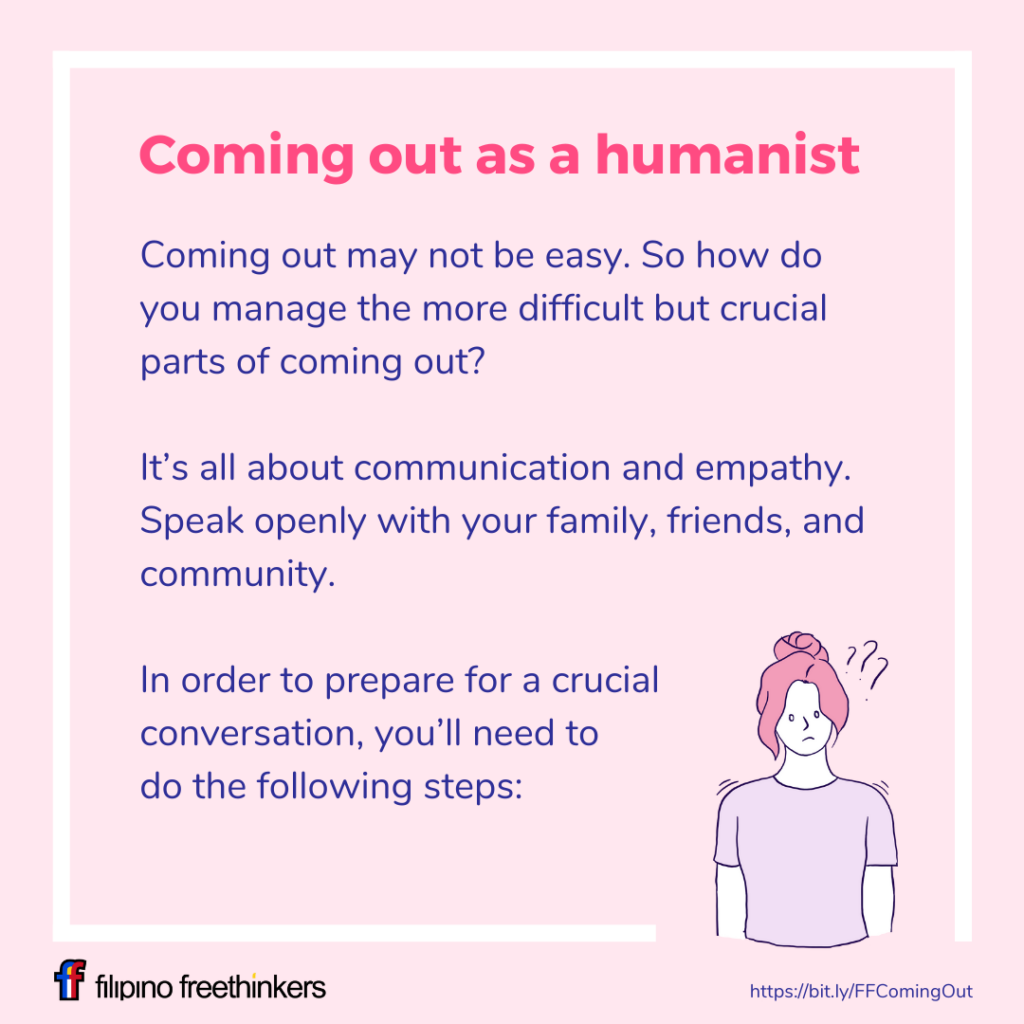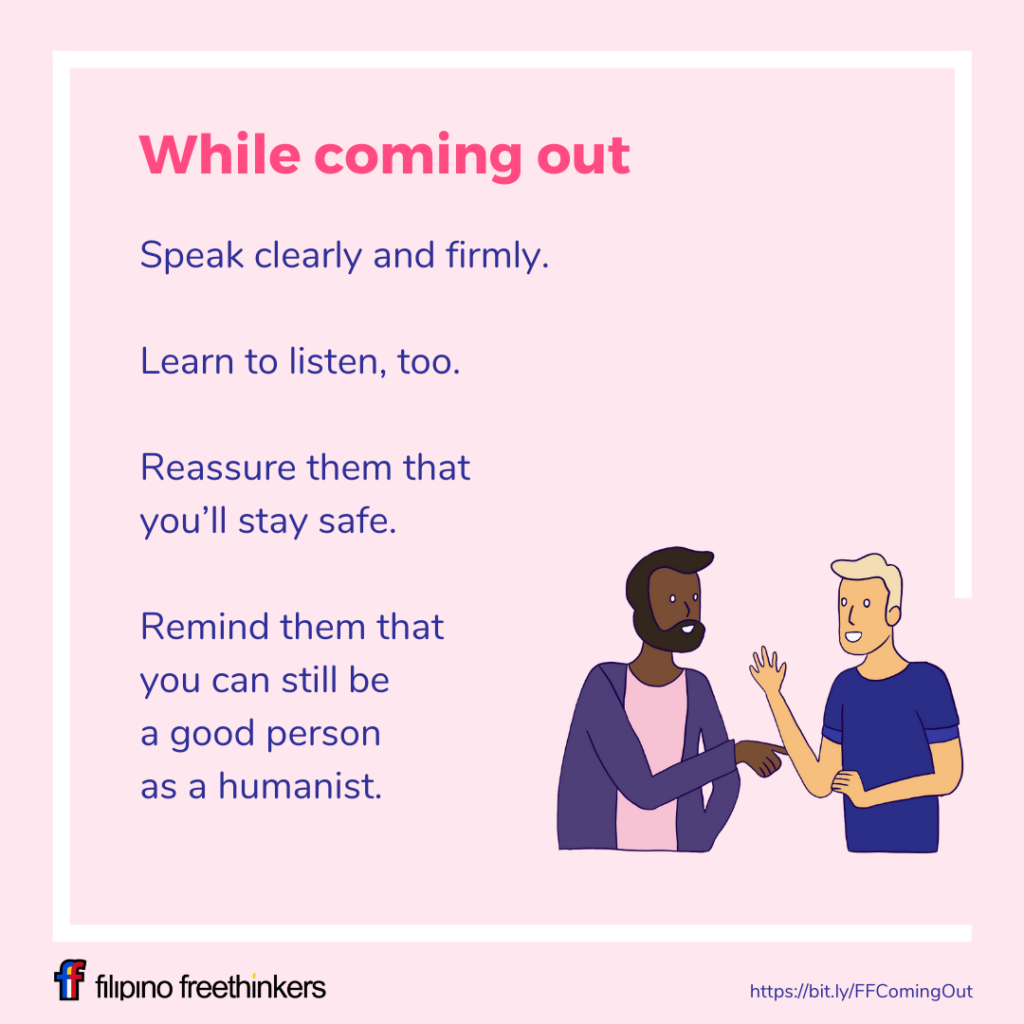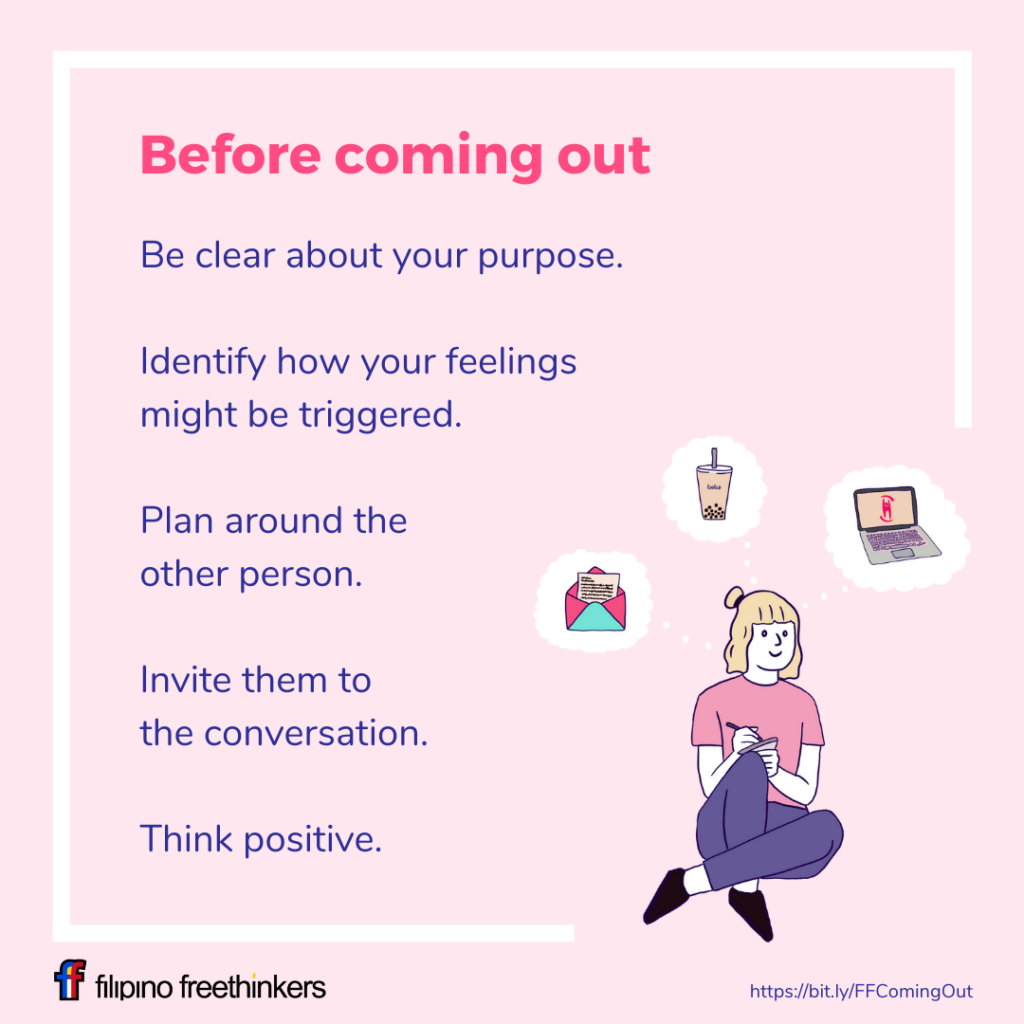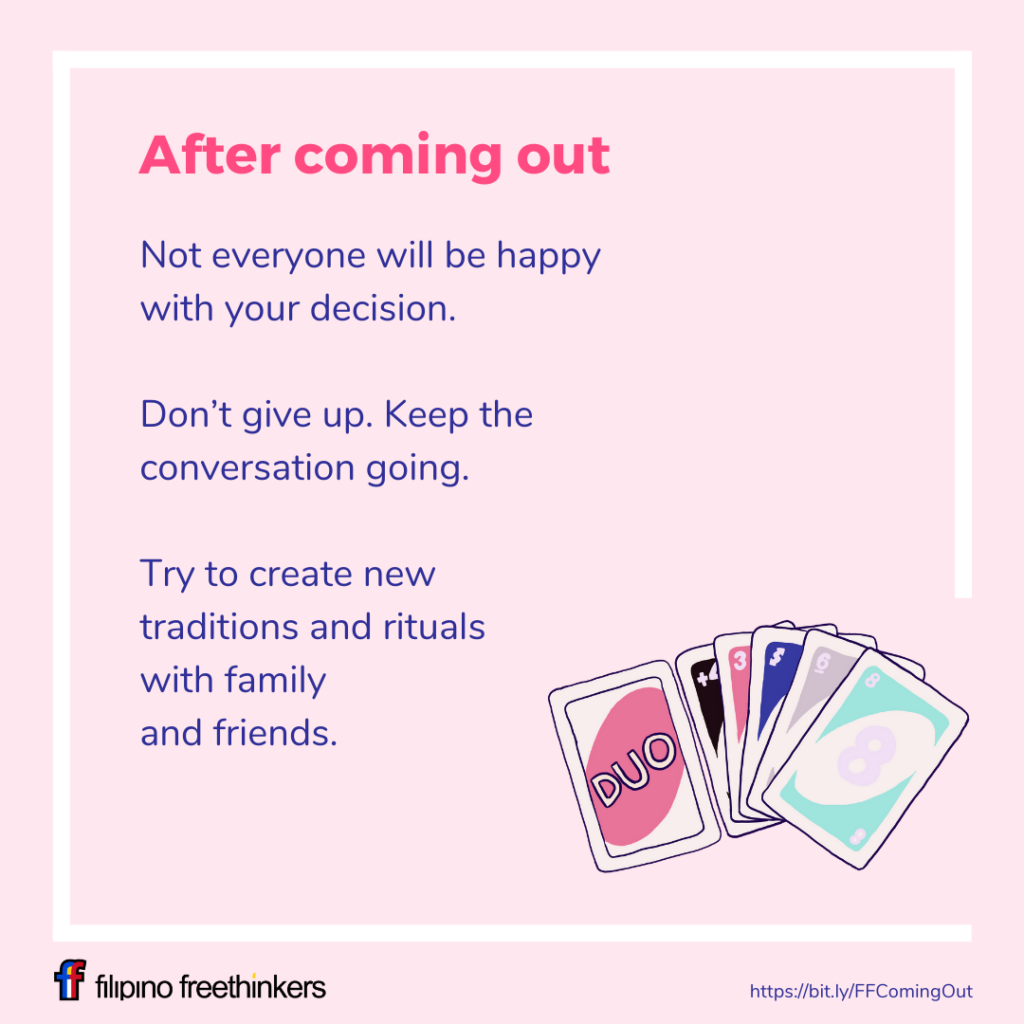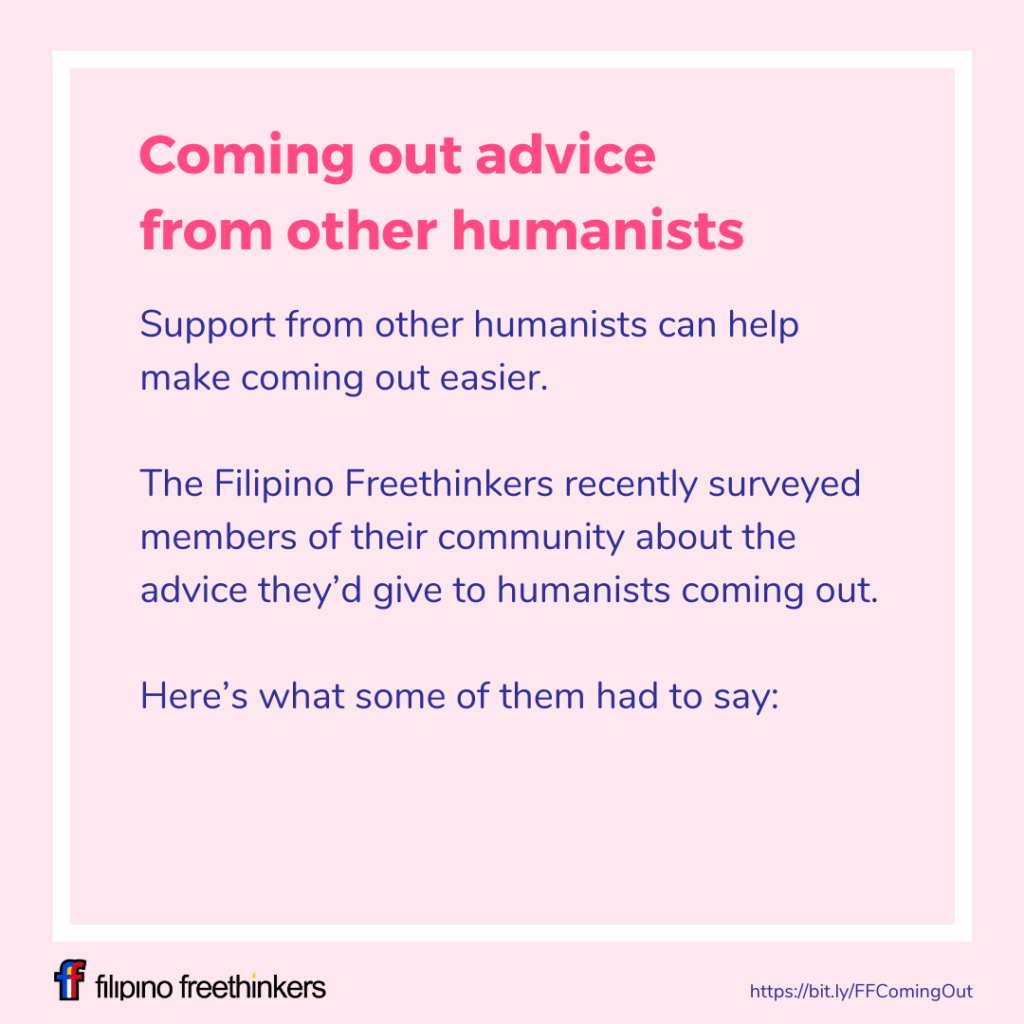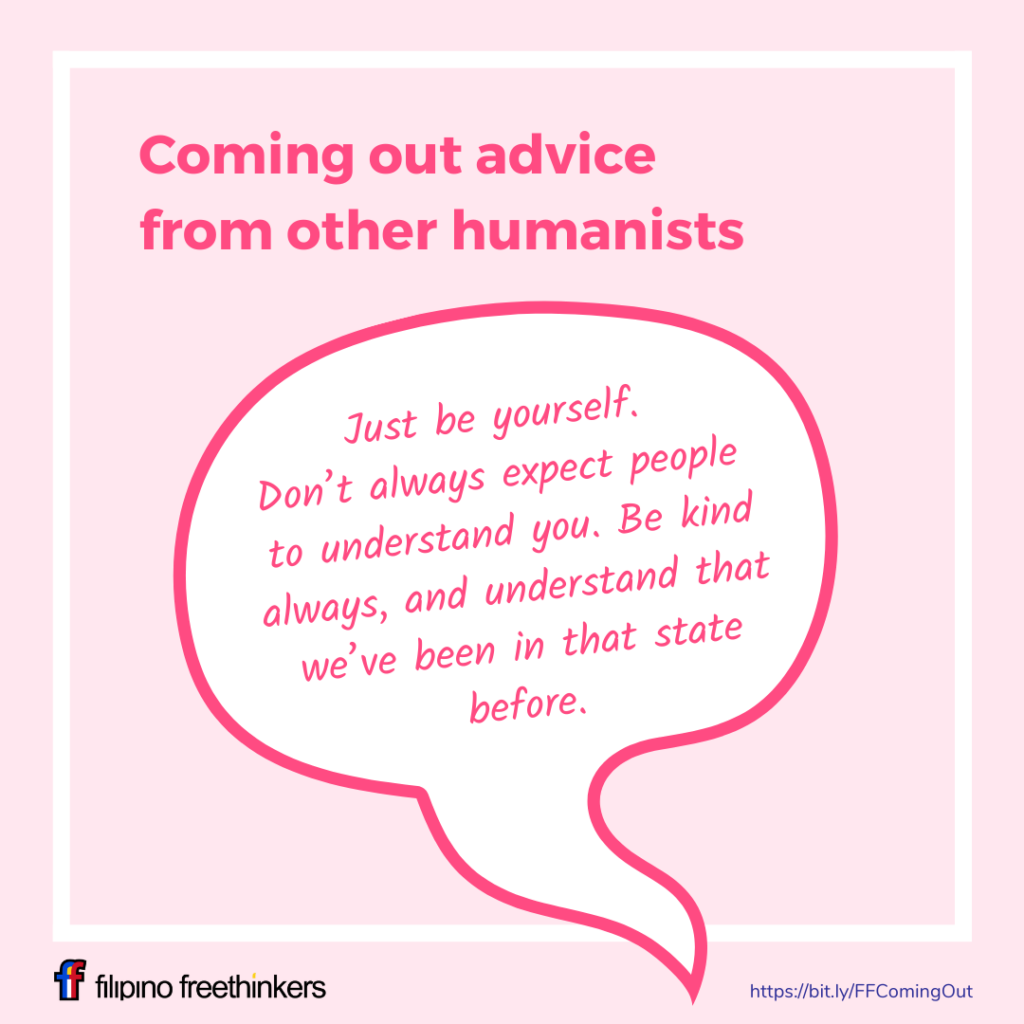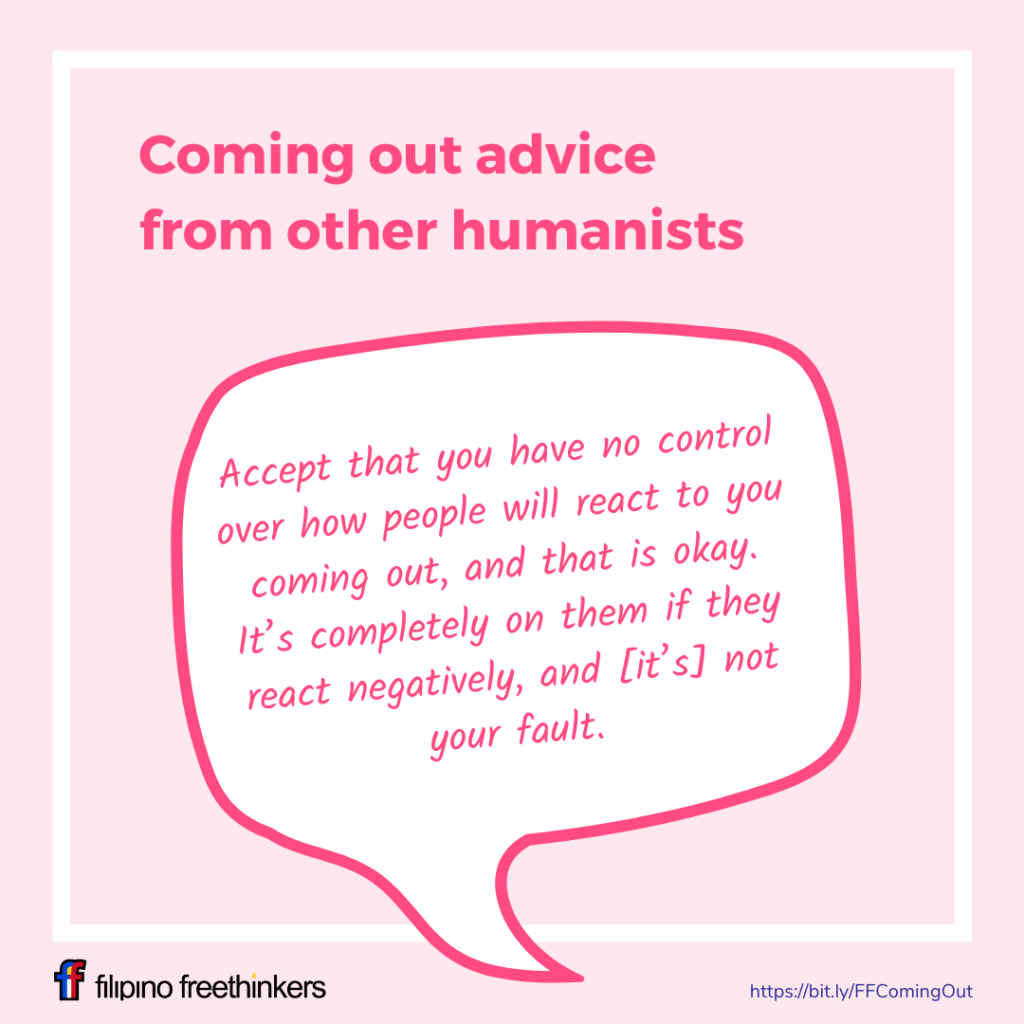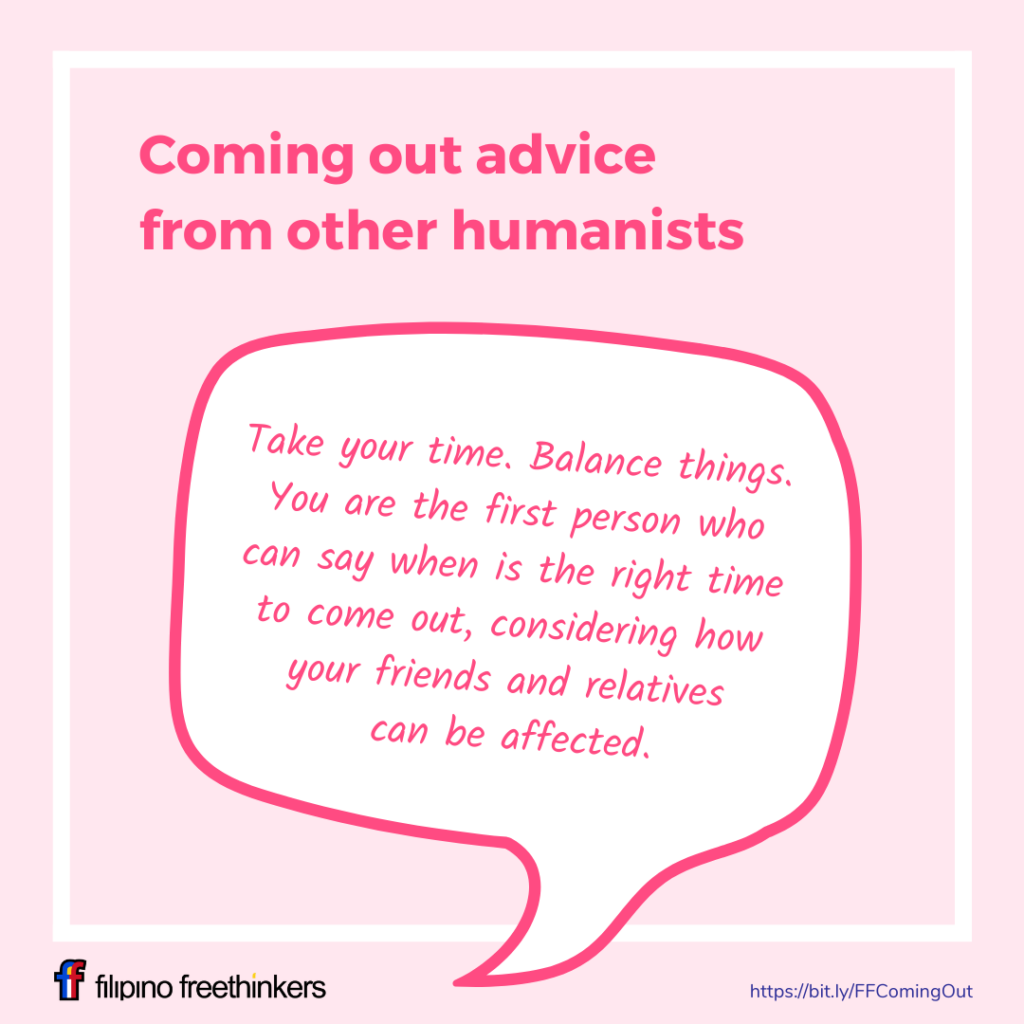In celebration of World Mental Health Day, we are sharing excerpts from a series of educational modules we are producing in collaboration with Humanists International. Whether you’re deciding to come out or a person has come out to you, consider mental health issues and follow this guide for calmer discussions.
May the excerpt below contribute to encouraging more people to come out as humanists. It could do wonders for your mental health! Happy World Mental Health Day!
Coming out as a humanist
Introduction
The choice to become a humanist does not come easy for everyone. While some might adapt to this new perspective rather quickly, others may wrestle with different kinds of internal conflict brought about by their religious upbringing. They may feel guilt, shame, even disgust, before fully embracing humanism.
In many cases, however, becoming a humanist isn’t the problem. Often, telling other people that they’re humanists is what creates conflict.

Coming out
For many people, humanism—or secularism, in general—may not be the norm. In a community, there might only be a few humanists, and therefore might be considered different or treated as outsiders. But as with anything people lean on to define their identities, from sexuality to personal philosophies, when you have the freedom to freely express yourself as a humanist, you have a better chance to live a more fulfilling life.
This is why it is important to be able to come out as a humanist, to be more vocal or public about humanism being part of your identity. In this module, you’ll learn how to come out in a way that feels comfortable to you. You’ll also learn how you can resolve the conflicts that commonly come with this revelation.
But before you take steps to come out, you first need to decide if it’s something you want to do in the first place.
Should you come out?
As much as possible, humanists advocate for freedom of expression, but there are unique situations where it might not be safe for you to be out—at least, not yet. Maybe you live with abusive parents. Maybe your country’s government punishes secularists and atheists for being blasphemous. Or maybe you don’t feel emotionally ready to deal with any issues that might arise from your coming out.
It is absolutely okay if you are not ready to come out.
If you believe that coming out as a humanist may cause harm to your well-being, your priority should be your safety. Protect yourself from potential harm, be it physical or emotional. It’s perfectly alright to be a humanist in private, for the time being, if that will keep you safe.
So how do you know it’s safe?
Know the risks
If you plan to come out as a humanist, the risks to your well-being will most likely come from two main sources: your interpersonal relationships and the sociopolitical situation where you live.
Your interpersonal relationships
A religious upbringing can make things complicated when it comes to relationships between those who leave a religion and those who stay. Many spend a lot of time in activities with their religious communities, from childhood to adulthood.
Leaving your religion might even feel like you’re breaking up with your church. A lot of humanists refer to this as “disaffiliation.” This step often comes with a loss of support systems, which in turn can negatively impact your mental, emotional, and physical health.
These relationship issues can sometimes have an impact on your social circles beyond your immediate religious community. For instance, being out among devoutly religious co-workers may make you the odd person in the group, which might affect your working relationship with them, which in turn affects your individual performance.
If you plan on coming out, you need to prepare for possible changes in your relationships, and the areas of your life they will affect.
The sociopolitical situation
Different countries treat humanists in different ways. Some, like Belgium, are predominantly secular societies, making them ideal environments for humanists. In other countries, however, their governments and culture are shaped by religious fundamentalism, and they may be intolerant of secular thought. For example, Egyptian LGBTQIA+ activist Mohamed Hisham was harassed by the police after he talked about his atheism on television. He was forced into hiding, and he eventually relocated to Germany, where he is seeking asylum as of this writing.
Cases like Hisham’s show why it might be best to wait until you’re in a safer situation before you come out as a humanist. Depending on where you live, being public with your secularism may have severe consequences. In some countries, it could even be life-threatening.
Humanists International publishes an annual Freedom of Thought Report that summarizes every country’s performance when it comes to upholding the rights of non-religious people. You can refer to the report for your country’s record, and make your decision based on that. The report can be accessed at fot.humanists.international.
Once you understand the risks, you can choose to come out in whatever way you choose. Some people find that coming out even in an unsafe environment helps them embrace their humanism more. Others wait until they get themselves into safer environments before coming out. Either way is valid; what’s important is that you’re comfortable with your choice.
What to expect
Every humanist is unique, and so is your personal situation.
There is really no best approach to coming out. The path you choose depends heavily on what good things and bad things you think might come up after you make your declaration.

The good
For some people, being public about their atheism has helped them develop greater independence and empowerment. Some have felt validation from their friends who were also atheist, while others felt a sense of liberation.
Despite some challenges in the process, coming out has made them feel like there is more substance and meaning to their identities. Coming out has proven to be important for their self-concept, or their concept of who they are.
Having this strong sense of meaning in your identity can be immensely beneficial to your well-being.
The bad
Coming out as an atheist may lead to a loss of support systems, particularly in the religious community. Because atheists typically stop attending religious services, they lose contact with some of the people in their most regular social circles.
Atheists who just recently left their religions might also be subject to a form of discrimination by their former communities. They are sometimes viewed as having weak character, as being disappointments to God, and as traitors to their community.
In religious families, disaffiliation can lead to a lack of communication and understanding, to reduced participation in family events, and to painful emotional responses such as anger, disappointment, and shame. Parents often feel hurt by their children’s decision to become atheist, with some believing that their child has condemned themselves to hell.
When coming out as a humanist, remember to embrace the good and work with the bad. The impact on your personal circles may seem difficult, even painful, to deal with. But others have been able to resolve or overcome these issues in a healthy way.

How to move forward
Coming out may not be easy. So how do you manage the more difficult but crucial parts of coming out?
It’s all about communication and empathy. Speak openly with your family, friends, and community. This will help you understand who you are in relation to other people. This sense of understanding that will help you come out in a way that feels true to who you are. It will also help you manage the pain, betrayal, and concern felt by those who know you.
Before coming out
In order to prepare for a crucial conversation, you’ll need to do the following steps:
Be clear about your purpose.
Why do you want to come out as a humanist? Would doing this make your life better? How? Thinking about these questions will help you and remind you of why you decided to come out, and will help you stay on track in case the discussion starts getting emotional or difficult.
Identify how your feelings might be triggered.
Like many crucial conversations, coming out can leave you vulnerable. It’s important to anticipate what might trigger you during such an emotionally sensitive time. Think about what might make you feel hurt, angry, sad, or fearful. Knowing these things will help you manage your feelings better in case they do happen.
Plan around the other person.
Who are you coming out to? Every person is different, and some may be easier to come out to than others. You’ll need to plan around their personalities and your relationship with them if you want the conversation to go smoothly.
Invite them to the conversation.
Does your coming out need to be a big announcement? It might not be a good idea to come out all of a sudden. People sometimes react badly when they’re taken by surprise. It might be better to invite them to a personal conversation where you can talk about your feelings towards humanism. Giving them the ability to choose when and where you have the talk can help them to get into the right frame of mind.
Think positive.
We’re often our own worst enemies. If we believe that a conversation will go badly, we might unconsciously do or say things to make that happen. Keep a positive outcome in mind to help you enter the conversation with more confidence.
While coming out
Speak clearly and firmly.
Criticism often puts people on the defensive, making them less likely to listen to you. You can start by defining what humanism means to you, and why it’s important to you. Try to explain why you’ve chosen humanism without directly criticizing the religions of the person to whom you’re coming out.
Learn to listen, too.
Emotions run high when people feel like a conversation is one-sided. Show them that their opinions are valid. You can try saying, “I understand why you feel this way. But here’s why this is important to me…” whenever you come to a disagreement.
Reassure them that you’ll stay safe.
This is especially important in countries that are intolerant of non-religious people. You may need to make compromises, such as coming out only to a select group of people, if being a humanist in public would endanger your well-being.
Remind them that you can still be a good person as a humanist.
You’re simply shifting your morals to be independent of religion. You can give them examples of how, for many people, this has actually led to noble activities. Humanists can be good people, and good people can be humanists. There are many ways to be a good person, and these are not exclusive to religion.
After coming out
Not everyone will be happy with your decision.
Being open about your humanism can shift the status quo for many of your relationships, and you’ll have to learn to be okay with people simply tolerating your views, rather than enthusiastically accepting them.
Don’t give up.
Remember to keep the conversation going, especially with family members who might have difficulty understanding or accepting your decision. Stand firm in your need to feel seen—while making sure you see them, too.
Try to create new traditions and rituals.
These might help reduce the discomfort from the fact that you no longer participate in some of the traditions or rituals that they hold dear. For instance, instead of going to mass together, you can try suggesting something like a weekly family game night. Many connections are nurtured by the regularity of doing activities together; creating new ones balances out the loss of the old ones.
Different people in your social circles will have different reactions or feelings about your stance. That’s okay. You can help them understand by helping them become more familiar with the humanist community at large. Sometimes, it all boils down to a lack of trust or familiarity. Helping them understand that your fellow humanists are good people can help them overcome their unease.
Next steps

Joining the community
The final step to coming out as a humanist is finding a community of your own. A humanist community isn’t just for discussing philosophies. Your humanist community can also be a source of new support systems, which may help in place of any religious ones you may have left behind.
Many humanist organizations also help new humanists deal with the repercussions of coming out, providing resources and support as needed.
As a member of a humanist community, you’ll be able to join larger movements for humanistic causes. The Filipino Freethinkers works to foster a safe community for humanists in the Philippines. But the organization also actively works for more progressive legislation in the Philippines, and to repeal outdated laws with roots in religion.
Finding humanist groups in your country can be as easy as a simple Google search. If you’d like to join one that interacts with the global humanist community, you can also browse through Humanists International’s list of members at humanists.international.
You don’t have to be fully out to join a humanist community. Many of these groups understand the difficulties some people may have with coming out in public, and therefore welcome anonymous members. You can join one in whatever capacity you feel most comfortable with.
What matters most is that you are honest with yourself and with your humanism.
Read more content and check the references of these excerpts by downloading the module:
